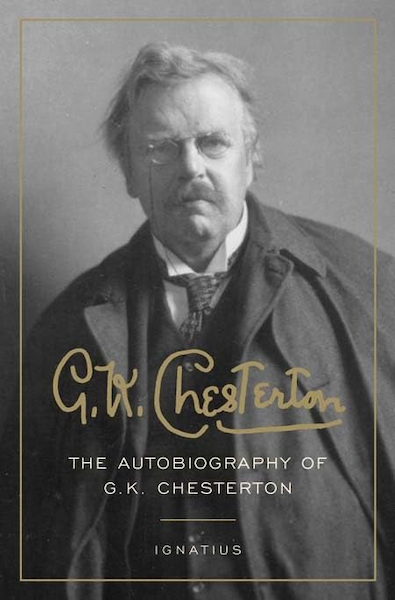
“[T]hroughout Chesterton’s life, however perplexing evil and sorrow might have been to him, they were not nearly so perplexing as existence itself and especially the existence of gladness and joy. In his Autobiography, he wrote: ‘The real difficulty with man is not to enjoy lamp-posts or landscapes, not to enjoy dandelions or chops; but to enjoy enjoyment. To keep the capacity of really liking what he likes; that is the practical problem which the philosopher has to solve’ (p. 323).
“Chesterton always felt that if one sought to explain pain, evil, and sorrow on the one hand, and delight and gaiety on the other, the latter were by far the more difficult and profound intellectual and moral enterprises. And he was right in this. From his childhood, he knew that gladness and joy existed; and, what is even more disturbing to any but a most humble man, he knew that he did not cause them, that he did not have, as the modern world claimed, a ‘right’ to them. ‘I, at least, leaned more and more to the old philosophy which said that (men’s) real rights came from wherever the dandelion came from,’ he continues,
and that they never will value either without recognizing its source. And in that ultimate sense uncreated man, man merely in the position of the babe unborn, has no right even to see a dandelion; for he could not himself have invented either the dandelion or the eyesight. (p. 325)
“Yet both the dandelion and the eyesight existed, and he enjoyed them both immensely.
“Listen further to how Chesterton, in a most touching passage, describes what he intended to do in his own Autobiography:
I have said that I had in childhood, and have partly preserved out of childhood, a certain romance of receptiveness, which has not been killed by sin or even by sorrow; for though I have not had great troubles, I have had many. A man does not grow old without being bothered; but I have grown old without being bored. Existence is still a strange thing to me; and as a stranger I give it welcome. (p. 329)
“We should not read this remarkable passage without recalling that Chesterton, who seems like such a good, honorable man, which he was, nevertheless affirmed that when asked why he finally had become a Catholic, he had humbly and yet surprisingly responded, ‘To get rid of my sins.’
“Indeed, the amount of attention the Autobiography pays both to sacramental confession of sins — ‘for there is no other religious system [besides Christianity] that does really profess to get rid of people’s sins’ — and also, even in descriptions of his boyhood, to the question of evil, is remarkable. In a famous passage, Chesterton converses with Father O’Connor about the depths of evil. He contrasts this conversation with one he had just heard, in which two superficial young Cambridge undergraduates had discussed the same topic. From this we realize that an almost innocent but highly intelligent man, like a Chesterton or a Saint Thomas, has in fact a thorough understanding of the reality and nature of evil. In a way similar to the writings of C. S. Lewis, Tolkien, George MacDonald, and Belloc, Chesterton’s work contains a most profound and disturbing realization of evil and sin. And Chesterton never talks as if this is a merely imaginary evil. Rather, in some sense, we feel on reading him that he has experienced these things and wants to get rid of them in his own life. This fact perhaps explains his constant attention to free will as an essential element in our being, the very basis of our possibility of sin or glory.
“For all his solemnity about the confession of sins and the nature of evil, Chesterton was continually bemused by life and, as he remarked, he was never bored. In spite of his travails, he retained a positive sense of joy that so puzzled him and yet constituted the abiding theme of his life. We have the unshakable impression that everyone, even those who disagreed with him most radically, not only admired Chesterton but loved him and loved to be with him. How is it, he often wondered, that we have within our lives the experience of delight and joy he had found from his very infancy?”
— from James V. Schall, S. J., “‘Never Enough of Nothing To Do’: On the Autobiography of G. K. Chesterton” (The World and I, August 1990)